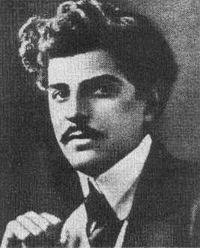Rupen Chilingirian was born on February 28, 1885, in the village of Silivri (Eastern Thrace), near Constantinople. He received his elementary education at the Askanazian school and then at the lyceum of Bardizag until 1901, when he moved to Constantinople. He graduated from the prestigious Berberian School in 1905, when he published his first poem, “Parting Words,” and adopted the pen name Rupen Sevag (sevag meaning “black eyes”). He would become mostly known as a lyrical poet, characterized by freshness and precision of language. He contributed to many publications in the Ottoman capital and abroad.
Sevag pursued medical studies at the University of Lausanne (Switzerland). The double massacre of Adana, with 30,000 victims in April 1909, influenced the work of the young poet, who also issued warnings about the impending danger over his compatriots. In 1910, he published his first collection of poetry, aptly entitled The Red Book, where he also touched upon the themes of social injustice, complaint, and rebellion.
He met Helene (Yanni) Apell, the daughter of a Prussian official. They married in 1910 at the Armenian church of Paris and returned to Lausanne. Rupen Sevag graduated in 1911 and worked for the next three years as an assistant physician at a local hospital and a clinic. His son Levon (1912-2005) was born in the Swiss city. In 1914, he decided to go back to Constantinople, where his daughter Shamiram (1914-2016) was born. After the Ottoman Empire entered the war, he was mobilized and served as a military doctor at the barracks of Makriköy.
In 1915, he gave lectures at the course of nursery organized by Armenian doctors. Three days after his daughter’s baptism, he was arrested on the fatidic night of April 24, 1915, and deported to Cangırı, in the region of Ankara, with many other intellectuals.
When in Cangırı, Sevag cured the daughter of Arabaji Ismail, a Turkish chetteh (bandit). Ismail advised him to marry his daughter and convert to Islam to save his life, but he rejected the offer. The many letters and addresses his wife and his father-in-law sent to the Foreign Ministry of Germany and the German ambassadors in Sofia and Constantinople were in vain.
On August 26, 1915, Rupen Sevag and fellow poet and friend Taniel Varoujan, together with three other Armenians, were dispatched to Ayaş, the other place where Armenian intellectuals had been exiled. Six hours into the route, in a place called Tuney, they were ambushed by a party of Turkish chettehs organized by the local secretary of the Ittihad Party and savagely murdered. Rupen Sevag was the last to be killed.
His wife Yanni took her children and returned to Lausanne in October 1915. Aware of German complicity in the genocide, she tried to distance them from the German identity and forbade them to speak German.
Rupen Sevag had planned to gather his poems in three collections, but this project was scuttled by his tragic fate. His poems, as well as his pieces of prose belonging to the series Pages Taken from a Doctor’s Diary,remained scattered in the press and were posthumously collected.
A school of Yerevan was renamed after the poet in 1995. The Rupen Sevag Museum was inaugurated in Holy Echmiadzin in 2013.
